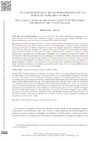Please use this identifier to cite or link to this item:
https://accedacris.ulpgc.es/jspui/handle/10553/114155
| Title: | El comercio ilegal de los portugueses con las Indias. El papel de Canarias | Other Titles: | The illegal trade of the Portuguese with the Indies. The role of the Canary Islands | Authors: | Lobo Cabrera, Manuel | UNESCO Clasification: | 550404-1 Historia moderna. Área americana 550606 Historia de la economía |
Keywords: | Canarias Portugueses Emigración Indias Ilegales, et al |
Issue Date: | 2021 | Conference: | XXIV Coloquio de Historia Canario-Americana | Abstract: | La presencia portuguesa en América está documentada desde etapas tempranas, aunque su presencia era considerada ilegal, pues desde el mismo momento del Descubrimiento se produjo un goteo constante de extranjeros que llegaron a América. La llegada de este aporte de emigrantes portugueses a los distintos puertos de las Indias se consideraba contrario a los intereses de la corona que desde bien pronto practicó una política migratoria bastante selectiva, dictando para ello distintas prohibiciones que se repetían de cuando en cuando a partir de las instrucciones que se habían dado al gobernador de la Española frey Nicolás de Ovando. Sin embargo, ello no fue óbice para que en una carta dirigida por los Jerónimos al cardenal Cisneros le indicaran la necesidad que había de que «todos los que quisiesen ir a las Indias de estos reinos o de reinos extraños lo puedan hacer, especialmente portugueses y de Canarias, porque en las islas Canarias se ha visto que los portugueses son grandes pobladores y granjeros». No obstante, la Corona presionada por el consulado sevillano, quiso entonces reducir la influencia portuguesa, considerando que la salida de navíos desde Lisboa o Canarias facilitaba tanto el contrabando como el transporte de ilegales. The Portuguese presence in America is documented from the early stages, although its presence was considered illegal, since from the moment of the Discovery there was a constant trickle of foreigners who arrived in America. The arrival of this contribution of Portuguese emigrants to the different ports of the Indies was considered contrary to the interests of the crown, which from very early on practiced a fairly selective immigration policy, dictating different prohibitions that were repeated from time to time from time to time. the instructions that had been given to the governor of Hispaniola, Frey Nicolás de Ovando. However, this was not an obstacle to the fact that in a letter addressed by the Jerónimos to Cardinal Cisneros they indicated the need for «all those who wanted to go to the Indies from these kingdoms or from foreign kingdoms to do so, especially Portuguese and of the Canary Islands, because in the Canary Islands it has been seen that the Portuguese are great settlers and farmers ». However, the Crown, under pressure from the Sevillian consulate, then wanted to reduce the Portuguese influence, considering that the departure of ships from Lisbon or the Canary Islands facilitated both smuggling and the transport of illegals. |
URI: | https://accedacris.ulpgc.es/handle/10553/114155 | ISSN: | 2386-6837 | Source: | Coloquio de Historia Canario-Americana [ISSN 2386-6837], v. XXIV(009) |
| Appears in Collections: | Actas de congresos |
Page view(s)
37
checked on Jan 10, 2026
Download(s)
7
checked on Jan 10, 2026
Google ScholarTM
Check
Share
Export metadata
Items in accedaCRIS are protected by copyright, with all rights reserved, unless otherwise indicated.
